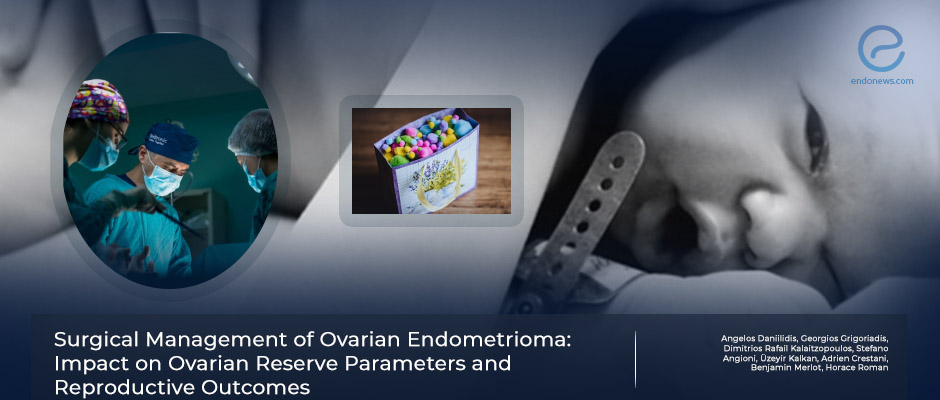Endometrioma surgery and the ovarian reserve
Oct 4, 2023
Surgical management of endometrioma may improve the probability of pregnancy.
Key Points
Importance:
- The optimal surgical approach for endometrioma is still controversial as attempts to prevent the recurrence may cause harmful procedures for fertility.
Highlights:
- Endometrioma surgical management is a major concern for surgeons. This study updates and classifies the published information in the field, with a spotlight on ovarian reserve conservation and the likelihood of pregnancy.
What's done here:
- This narrative review presents how various surgical techniques for endometrioma impact patients' ovarian reserves and fertility outcomes.
- Electronic research on PubMed and MEDLİNE databases using the words " endometrioma," "ovarian reserve," "anti-Müllerian hormone," "antral follicular count," "surgery," "fertility," and "pregnancy" was performed.
- The impact of various surgical options on the Anti-Müllerian hormone and oocyte antral follicular count was discussed, and the reproductive outcomes following the surgeries were evaluated.
Key Results:
- Systemic analyses of 11 selected papers showed performing cystectomy or ablative techniques for endometrioma causes a significant reduction in ovarian reserve with a prominent drop in anti-Müllerian hormone (AMH) levels.
- As an ovarian reserve marker, postoperative AMH decline was higher in patients with bilateral endometrioma and for patients over 38.
- Some research demonstrated postoperative decreased AMH levels, and antral follicular count(AFC) reductions improved in 6 to 12 months after surgery.
- The fertility outcomes of the patients in those studies varied depending on the selected operation type, the presence of a healthy ovary, the concurrent company of IVF, recurrent endometrioma operations, and the severity of the stage of the disease.
- No single operational technique is superior to others in terms of fertility outcomes.
- Spontaneous conception after endometrioma surgery seems low, so ART is used to achieve better fertility rates.
Lay Summary
Traditionally, cystectomy is the gold standard for surgical approach owing to the reduced risk of recurrence. Still, it may lead to a reduction in postoperative ovarian volume and can be a cause of ovarian failure. The recent conservative surgical management of endometrioma consists of cystectomy by stripping, ablative approaches by laser, bipolar diathermy, sclerotherapy with ethanol, and their combination. Various measures such as Anti-Müllerian hormone (AMH), antral follicle count (AFC), FSH, and Inhibin B have been used to assess the follicular pool. In recent years, ovarian reserve parameters have become Anti-Müllerian hormone (AMH) and antral follicle count (AFC). AMH is secreted from the granulosa cells of primary, pre-antral, and antral follicles, and regulates the number of primordial follicles. Decreased levels of AMH are associated with a significant reduction in ovarian reserve.
To update and classify the published information in the field, with a spotlight on ovarian reserve conservation and the likelihood of pregnancy, Dr. Daniilidis from the Department of Gynecology and Obstetrics of Aristotle University, Thessaloniki, Greece, reviewed the recent literature under the leadership of Dr. Horace Roman. The ovarian reserve loss after the surgery can demonstrated using AMH levels and ultrasonographic AFC determination. Based on this, the classical cystectomy approach appears to cause more loss of follicles and ovarian stroma. However, this method seems advantageous regarding recurrence rate and spontaneous conception after the surgery. On the other hand, ablative techniques may be promising for the future due to less damage to ovarian parenchyma.
The results of eleven studies examined indicated "no single operational technique is superior to others in terms of fertility outcomes". When comparing ART before or after surgery, various systemic reviews and meta-analyses have demonstrated no significant improvement in clinical pregnancy or live birth rates.
The authors recommended measuring the AMH levels of the patient and informing her about fertility outcomes preoperatively. Deciding the appropriate type of surgery is essential for every patient, while the surgical expertise of the clinician will play another important role in the treatment and preventing the recurrence of endometriosis.
This interesting review was recently published in the Journal of Clinical Medicine.
Research Source: https://pubmed.ncbi.nlm.nih.gov/37629367/
ovarian reserve endometrioma cystectomy anti-Müllerian hormone antral follicular count laser sclerotherapy fertility outcomes pregnancy endometriosis.

